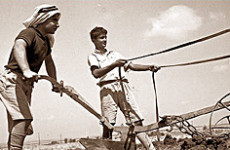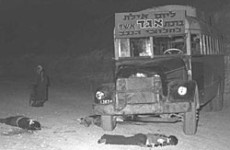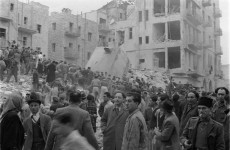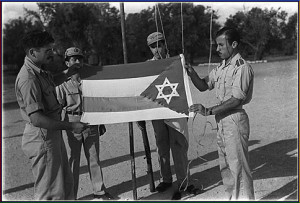
The Druze people reside primarily in Israel, Syria and Lebanon. It is an Arab-speaking community loyal to the state that has suffered hundreds of casualties in its defense, and whose men serve today in high-ranking and sensitive positions within the Israeli military and security forces. In Israel the majority of the Druze consider themselves a distinct ethnic group and do not identify themselves as Arab.
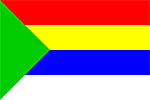 The Druze community in Israel is officially recognized as a separate religious entity with its own courts (with jurisdiction in matters of personal status – marriage, divorce, maintenance and adoption) and spiritual leadership. Their culture is Arab and their language Arabic but they opted against mainstream Arab nationalism in 1948 and have since served (first as volunteers, later within the draft system) in the Israel Defense Forces and the Border Police (here is an article on the first Druze navigator in the Israeli Air-Force).
The Druze community in Israel is officially recognized as a separate religious entity with its own courts (with jurisdiction in matters of personal status – marriage, divorce, maintenance and adoption) and spiritual leadership. Their culture is Arab and their language Arabic but they opted against mainstream Arab nationalism in 1948 and have since served (first as volunteers, later within the draft system) in the Israel Defense Forces and the Border Police (here is an article on the first Druze navigator in the Israeli Air-Force).
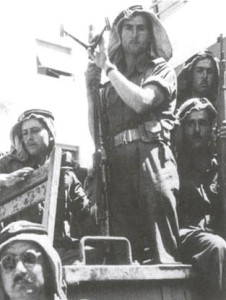
Worldwide there are probably about one million Druze living mainly in Syria and Lebanon, with 104,000 in Israel, including about 18,000 in the Golan (which came under Israeli rule in 1967) and several thousands who emigrated to Europe and North and South America.
The Druze community in Israel has a special standing among the country’s minority groups, and members of the community have attained high-level positions in the political, public and military spheres.
Missing Druze Soldier
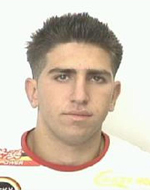
Majdy Halaby, son of Fahmiya and Nazmy, is a Druze soldier from the village of Dalyat El Karmel who has been missing since May 2005. Majdy served in an ordnance corps camp near the town of Tirat Ha-Carmel, south of Haifa. He was last seen on 24th of May 2005 around five in the afternoon. He was carrying a bag on his back, and was standing in a hitchhiking stop close to Haapoalim bank branch in his village, trying to hitchike back to his base. Majdy was 19 years old the day he disappeared. He is 170 cm tall (5’6), of slim built, brown eyes, short brown hair, speaks Arabic and Hebrew. On June 6th, 2005, Majdy was declared an IDF missing soldier. On June 10th, 2007 Israel’s Prime Minister authorized that “Born to freedom” foundation would also help locate Majdy Halaby. “Born to freedom” foundation offers a prize of 10 million dollars for any information which might solve the mystery of Majdy Halaby’s disappearance. “Born to freedom” website
Historical Background
The Druze religion has its roots in Ismailism, a religio-philosophical movement which founded the Fatimid Caliphate in Egypt in the tenth century. During the reign of al-Hakim (996 – 1021) the Druze creed came into being, blending Islamic monotheism with Greek philosophy and Hindu influences. Active proselytizing of the new creed was brief; since about 1050 the community has been closed to outsiders.
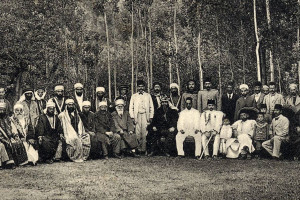
The first Druze settled in what is now southern Lebanon and northern Israel. By the time of the Ottoman conquest of Syria (1516), Druze also lived in the hill country near Aleppo, and Sultan Selim I recognized Fakhr al-Din as Emir of the Druze, with local authority. Civil strife between the Lebanese Druze and the Maronite Christians ended in 1860 with the autonomous administration of Mt. Lebanon, which was imposed by the great powers. The Druze never regained ascendancy in the region and the center of the community passed to Mt. Hauran in Syria, which became known as Jebel-el-Druze (Mountain of the Druze) – the name formerly synonymous with Mt. Lebanon.
Until the end of Ottoman rule (1918), the Druze were governed by emirs, as a semi-autonomous community. In 1921 the French tried to set up a Druze state under the French Mandate, but the attempt failed.
The Druze in Galilee and on Mount Carmel have always kept in contact with the other branches of the community, especially with those of Mt. Hermon and Lebanon. During the British Mandate over Palestine they refrained from taking part in the Arab-Jewish conflict, and during Israel’s War of Independence (1948) became active participants on Israel’s side.
Beliefs and Traditions
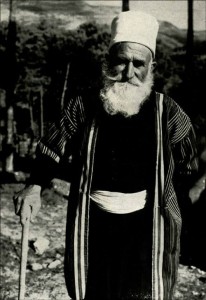
The Druze consider their faith to be a new interpretation of the three monotheistic religions: Judaism, Christianity and Islam. For them, the traditional story of the Creation is a parable, which describes Adam not as the first human being, but as the first person to believe in one god. Since then, the idea of monotheism has been disseminated by “emissaries” or prophets, guided by “mentors” who embody the spirit of monotheism. The mentors and prophets come from all three religions, and include Jethro and Moses, John the Baptist and Jesus of Nazareth, and Salman the Persian and Mohammed – all reincarnations of the same monotheistic idea. In addition, the Druze hold other influential people – regardless of their religion – in great esteem, as the advocates of justice and belief in one god. These include the Egyptian Akhenaton, the Greek philosophers Socrates, Plato and Aristotle, and Alexander the Great.
Although the Druze recognize all three monotheistic religions, they believe that rituals and ceremonies have caused Jews, Christians, and Muslims to turn aside from “pure faith”. They argue that individuals who believe that God will forgive them if they fast and pray, will commit transgressions in the expectation of being forgiven – and then repeat their sins. The Druze thus eliminated all elements of ritual and ceremony; there is no fixed daily liturgy, no defined holy days, and no pilgrimage obligations. The Druze perform their spiritual reckoning with God at all times, and consequently need no special days of fasting or atonement.
The Druze religion is secret and closed to converts. From the theological perspective, the secrecy derives from the tenet that the gates of the religion were open to new believers for the space of a generation when it was first revealed and everyone was invited to join. Since in their belief everyone alive today is the reincarnation of someone who lived at that time, there is no reason to allow them to join today. Therefore, the Druze refrain from missionizing, and no member of another religion can become Druze.
Druze religious books are accessible only to the initiates, the uqqal (“knowers”). The juhal (“ignorant ones”) accept the faith on the basis of the tradition handed down from generation to generation.
Tenets and Precepts
The Druze religion has no ceremonies or rituals, and no obligation to perform precepts in public. The main tenets that obligate all Druze, both uqqal and juhal, are:
- Speaking the truth (instead of prayer)
- Supporting your brethren (instead of charity)
- Abandoning the old creeds (instead of fasting)
- Purification from heresy (instead of pilgrimage)
- Accepting the unity of God
- Submitting to the will of God (instead of holy war)
The uqqal are bound by more precepts than the juhal. Their external appearance is also different: the men have a shaven head covered by a white turban, a mustache and a beard; the women wear a white head scarf, called a naqab. The most pious among the women hide all their hair under a separate covering, the iraqiyah, which is fastened around the head underneath the white scarf. Druze are forbidden to eat pork, smoke, or drink alcohol.
Druze Women
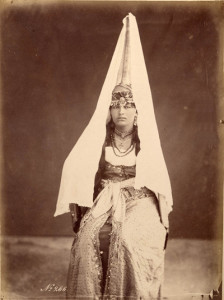
Druze women can attain positions of religious significance, and some have indeed achieved high rank. Regarding personal status, their rights are almost identical to those of men; actually, Druze women are preferred over men in joining the uqqal, because they are considered to be better “spiritually prepared”. Consequently, there are more women than men among the uqqal. Female uqqal take part in the religious assemblies in the hilwah (prayer house), but sit separately from the men.
Uqqal men and women usually intermarry. If a juhal wishes to marry a member of the uqqal, the former is expected to declare in advance his/her intention to join in the near future. Druze men, both uqqal and juhal, may not have more than one wife, nor may they remarry their divorced wife, or even be under the same roof with her. Also, a male uqqal may not be alone with a woman who is not a close relative (spouse, daughter, sister, mother) nor even respond to her greeting unless a third person is present. Both men and women are encouraged to guard themselves against immodest or impulsive behavior.
The Druze Educational System
Since the founding of the State of Israel in 1948, the Druze educational system has flourished. In 1948/49, only 981 Druze were enrolled in school – 881 boys and 100 girls. Some 30 years later, there were 18,729 Druze students, an increase by a factor of 19. Today there are over 30,000 Druze students in the school system – some 2.3% of all pupils in Israel, although the representation of Druze in the general population is only 1.6%.
by Dr. Naim Aridi, Source: Israeli Foreign Ministry


